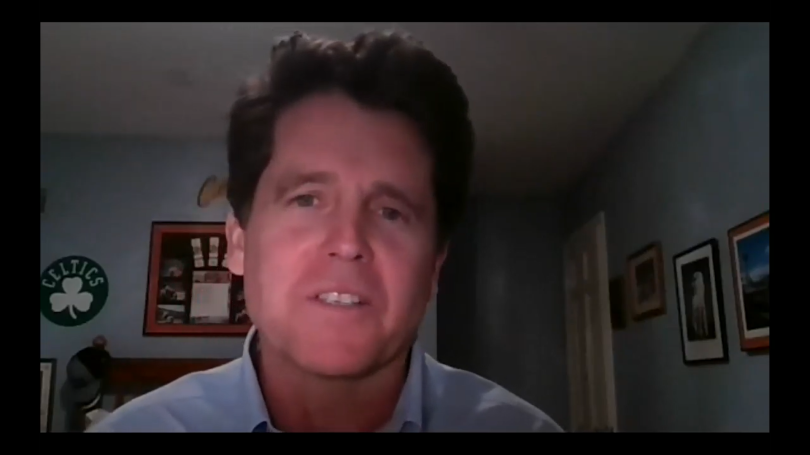
- Public Policy
- Leadership
- Funding
- News & Events
- About the Center
Back to Top Nav
Back to Top Nav
Back to Top Nav
Back to Top Nav
On Tuesday, March 9th, 2021 Mark Shriver, Senior Vice President of U.S. Programs & Advocacy at Save the Children, and Glenn Blumhorst, President and CEO of the National Peace Corps Association, met with Dartmouth students and community members at the Rockefeller Center’s final Rocky Watch event of the winter term. Rocky Watch is a weekly series of live broadcasts hosted by the Rockefeller Center to create a virtual common space for community discussion and intellectual engagement in this time of remote learning.
Tuesday’s discussion focused on the legacy of the Peace Corps on its 60th anniversary—and what lies ahead for the organization at a time of domestic and international upheaval. The event was moderated by Professor Elizabeth Wilson, the director of the Arthur L. Irving Institute for Energy and Society. Wilson was a Peace Corps volunteer in Burundi at the start of her career.
Shriver began the talk by reflecting on the legacy of the Peace Corps. His father, Sargent Shriver, was the visionary first director of the Peace Corps. Shriver and President Kennedy established the Peace Corps in 1961 over questions about the ability of a Peace Corps to further America’s interests and better the world. In spite of this early skepticism, the Peace Corps “hit the ground running” under Shriver’s leadership and quickly established itself as an important arm of America’s soft power.
Since the Peace Corps’ founding, volunteers have traveled around the world to provide assistance and solidarity. Peace Corps volunteers are required to: 1) learn the language of the people whom they serve; 2) be willing to make personal sacrifices; 3) anchor themselves in the culture and traditions of the country they are in; 4) adjust their standard of living to that of the society they are in; 5) believe in the power of personal integrity, humility, and determination. “The Peace Corps seeks peace through service, not through economic strength nor military power,” Shriver says, quoting a speech delivered by his father.
Blumhorst spoke next, thanking Dartmouth for its vibrant history of Peace Corps service. “657 Dartmouth alums have served as volunteers [in the Peace Corps],” Blumhorst says. But in spite of major accomplishments over the 60-year history of the Peace Corps, Blumhorst notes that “the cause of building peace and friendship is far from finished.”
The events of this year have been especially challenging for the Peace Corps. The COVID pandemic forced the Peace Corps to bring home all 7,300 of its volunteers last year, an unprecedented move. At home, the summer’s protests against racial injustice prompted deep introspection within the Peace Corps about what its role should be abroad. “We don’t simply want to see Peace Corps redeploy volunteers back under the same context,” Blumhorst argues, “it is time for what we consider [to be] very historic changes.”
In terms of changes, many at the NPCA would like to ensure that “white savior complex and neocolonialism aren’t reinforced” by Peace Corps actions. This means that “volunteers will need to go to these countries as partners, not saviors,” Blumhorst says. Blumhorst also mentioned establishing an office on minority recruitment, partnering with HBCUs, instituting antiracism training for volunteers, and putting more people of color in leadership positions as important avenues through which the Peace Corps could represent all of America.
Moreover, both Blumhorst and Shriver expressed excitement about the bipartisan Peace Corps Reauthorization Act, which aims to increase Peace Corps funding from $450 million next year to $600 million by 2025. This act would allow the Peace Corps to accept more applicants and would assist in the “reimagining, reshaping, and retooling” of the organization.
Under the Biden Administration, Blumhorst believes the Peace Corps will need a director “of national stature and influence,” who—like Sargent Shriver—has the gravitas to steward the Peace Corps through an era of upheaval. That person, Blumhorst and Shriver agree, will need to be able to advocate for the organization and ensure that it has the funds to complete its mission. “Heroes are people who make peace,” Shriver said, lamenting the fact that the Peace Corps budget is miniscule in comparison to what the military receives each year. The Peace Corps won’t fully realize its mission “until we all get fired up… about it.”
Written by Ben Vagle ’22, Rockefeller Center Student Assistant for Public Programs